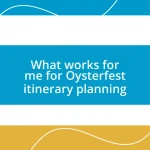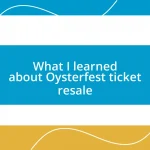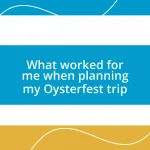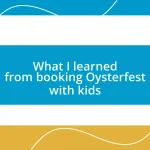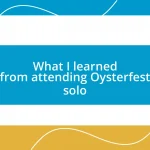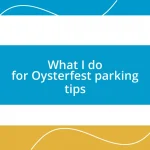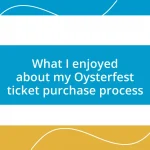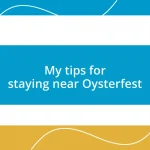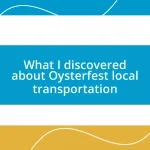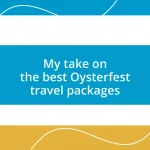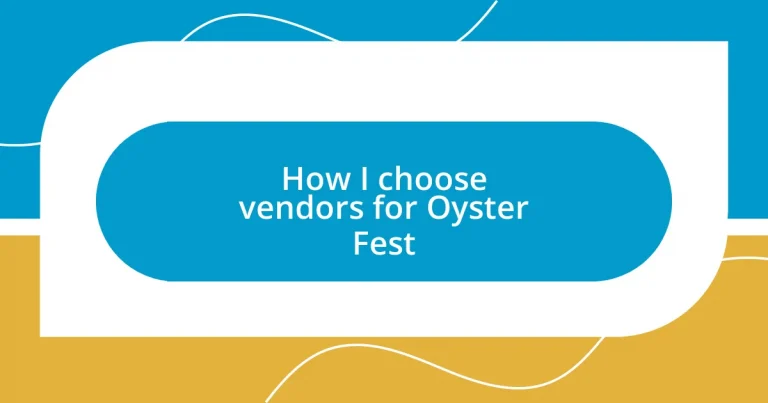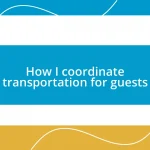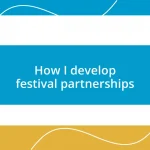Key takeaways:
- Vendor selection balances quality, value, and reliability, focusing on fresh, sustainably sourced oysters and engaging experiences for festival-goers.
- Thorough research involves online reviews, taste tests, and direct vendor interactions to assess their performance and community involvement.
- Strong vendor relationships are built through clear agreements, open communication, mutual support during events, and recognition of hard work post-festival.
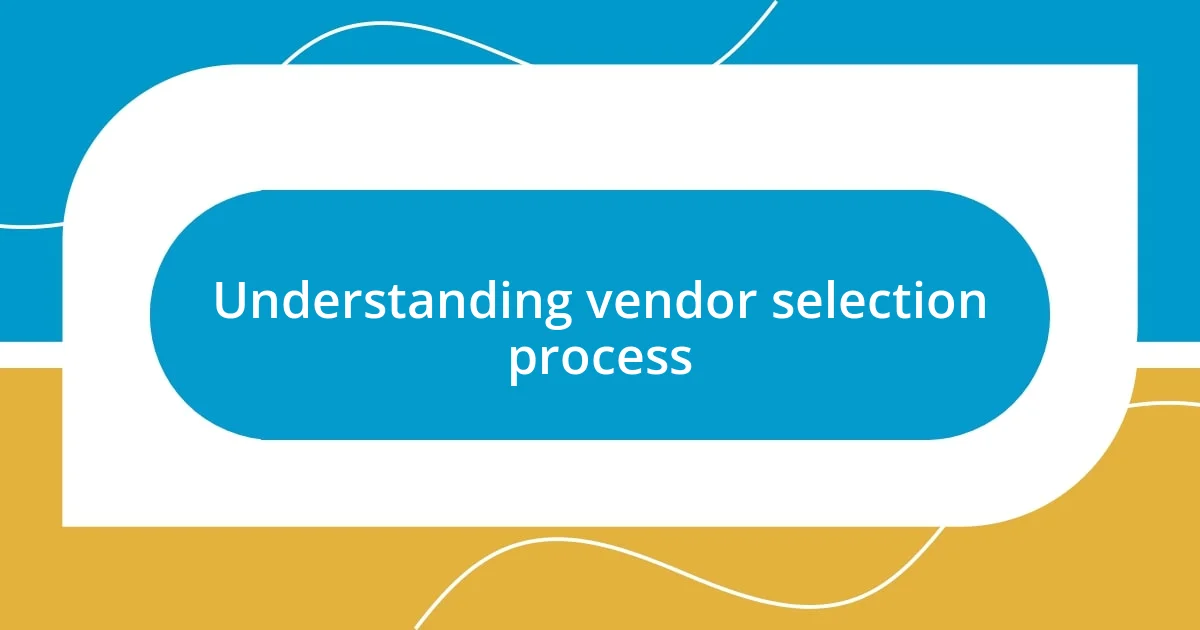
Understanding vendor selection process
When it comes to selecting vendors for Oyster Fest, the process feels almost like piecing together a jigsaw puzzle. I often think about the balance between quality and value; it’s not just about who can offer the lowest price, but about who can deliver the most delicious oysters while ensuring a memorable experience. Have you ever tasted an oyster that just didn’t feel right? That’s what we want to avoid; the right vendor sets the stage for unforgettable flavors.
In my experience, I always start by gathering recommendations from fellow festival organizers or local foodies. Last year, I remember attending a seafood tasting event where I met a vendor who had an infectious passion for sustainable sourcing. That kind of enthusiasm is what I look for—it indicates not only commitment to quality but also a connection to the community. When vendors share their stories, it gives me insight into their values and approach.
Additionally, visiting potential vendors at their restaurants or food trucks has become a staple in my selection process. I love experiencing their customer service firsthand, which tells me how they might interact with fest-goers. It’s thrilling to see how they prepare their dishes and engage with patrons. This hands-on observation can make or break a decision. Have you ever felt that spark of excitement when you know you’ve found the right fit? That’s the feeling I chase during vendor selection; it’s all about curating an experience that leaves everyone craving more.
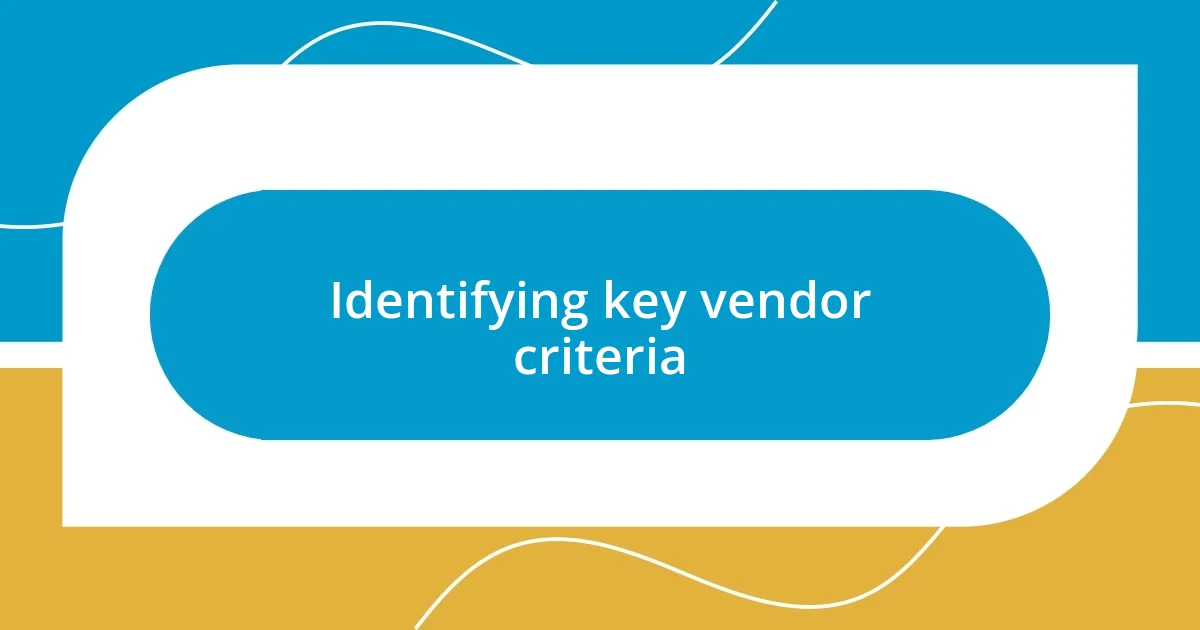
Identifying key vendor criteria
When identifying key vendor criteria, I focus on several important aspects that can significantly impact the overall experience at Oyster Fest. For me, quality is paramount; I want oysters that are fresh, flavorful, and sourced responsibly. I recall one vendor who, despite being a bit pricier, offered stunningly fresh oysters that thrilled the attendees. That experience reaffirmed my belief that the right vendor can elevate the entire festival.
Another crucial criterion is reliability. I prefer vendors who have a proven track record of meeting deadlines and delivering on their promises. Last year, a vendor canceled last minute, which prompted a frenzy in our planning. Learning from that, I now prioritize past performance during my selection process. A dependable vendor can ease a lot of stress as the event approaches.
Lastly, I assess the vendor’s ability to engage and interact with festival-goers. It’s not just about serving food; it’s about creating an atmosphere and building connections. I once saw a vendor who set up a “Meet the Shucker” station, which not only drew crowds but also enriched the experience. It’s moments like these that I seek out when evaluating potential vendors—I want them to be as passionate about the event as we are.
| Key Criteria | Description |
|---|---|
| Quality | Freshness and flavor of oysters, with a focus on sustainable sourcing. |
| Reliability | Past performance in meeting deadlines and honoring commitments. |
| Engagement | Ability to create an interactive and memorable experience for attendees. |
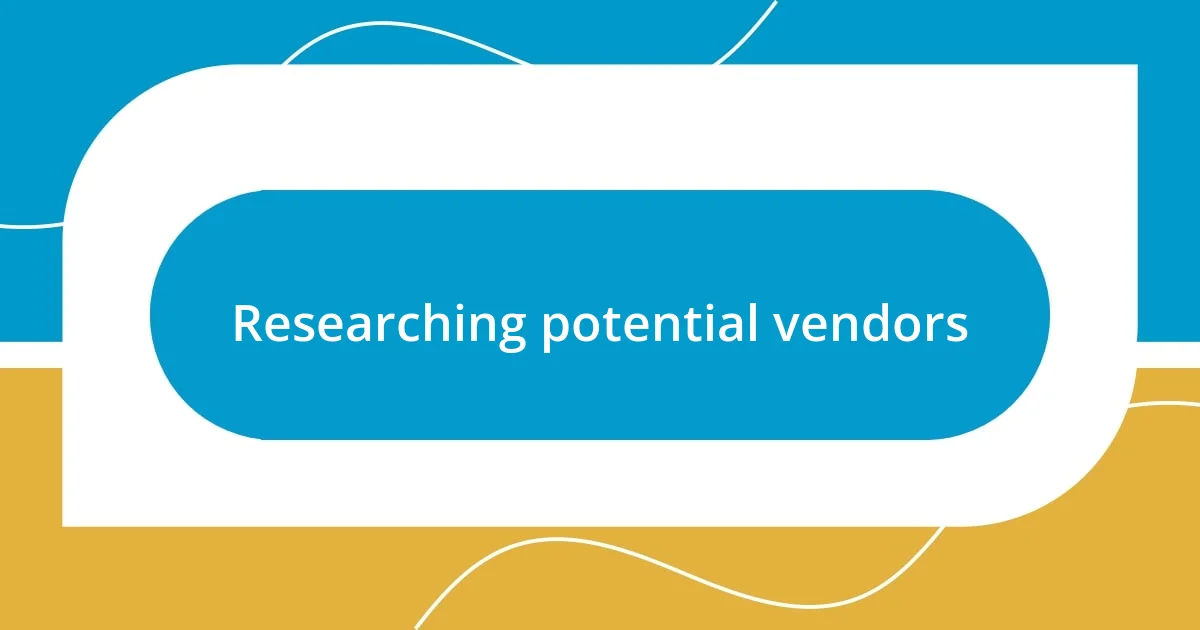
Researching potential vendors
Researching potential vendors is more of an adventure than you might think. I dive into online reviews and social media profiles to gauge the public’s perception. One afternoon, I spent hours scrolling through posts, uncovering a hidden gem with rave reviews and mouthwatering photos. It was exhilarating to discover a vendor whose oysters had the community buzzing, and it instantly piqued my interest. Really, being attuned to the chatter around these vendors helps me identify who’s making waves and who’s swimming in circles.
When researching, I also reach out directly to vendors for a taste test. Trust me, there’s nothing quite like the thrill of sampling their offerings before the event. Here’s a quick rundown of my favorite research tips:
- Social Media Scrutinizing: Explore vendors’ profiles for customer feedback and food presentation.
- Taste Test: Arranging a sampling session allows me to judge the flavor and freshness firsthand.
- Reliability Check: I ask for testimonials or verify their references to get a clearer picture of their past performance.
- Community Engagement: Observing how vendors interact with their customer base is crucial; it gives insight into their passion and approach.
- Local Events: Attending food festivals or markets helps me scout potential vendors in real-time.
It’s this combination of digital sleuthing and real-life discovery that shapes my understanding of which vendors will shine at Oyster Fest.
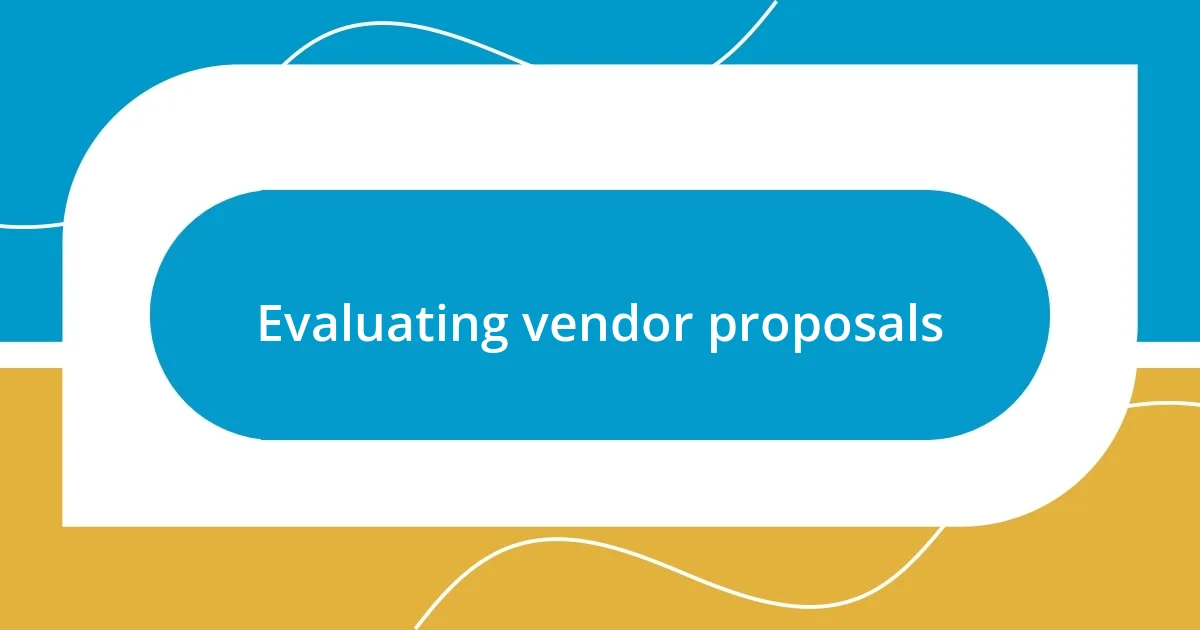
Evaluating vendor proposals
Evaluating vendor proposals is where the excitement of choice really kicks in for me. Each proposal arrives with its own flavor, almost like unwrapping a gift at a birthday party. I like to dig deep into the details: Are they offering unique dishes or just the same old options? I remember one vendor who pitched a smoked oyster slider that instantly caught my attention. Who wouldn’t want something that adds a twist to the traditional oyster experience? That’s the kind of creativity I look for.
As I sift through the proposals, I pay close attention to how well they align with our key criteria. It’s fascinating to see which vendors genuinely understand our vision for Oyster Fest. I once received a proposal that included a detailed plan for an interactive shucking demonstration alongside delectable tastings. It wasn’t just about selling; it was about engagement. I found myself nodding along, thinking, “Yes, this is exactly the vibe we aim for!”
Moreover, I typically look for pricing transparency and value. I’ve learned the hard way that a lower price isn’t always the best route. One year, I went with the cheapest option and ended up disappointed with the quality. It made me rethink my approach. Now, I assess the overall value, including quality, service, and experience. It’s all about striking that perfect balance, wouldn’t you agree?
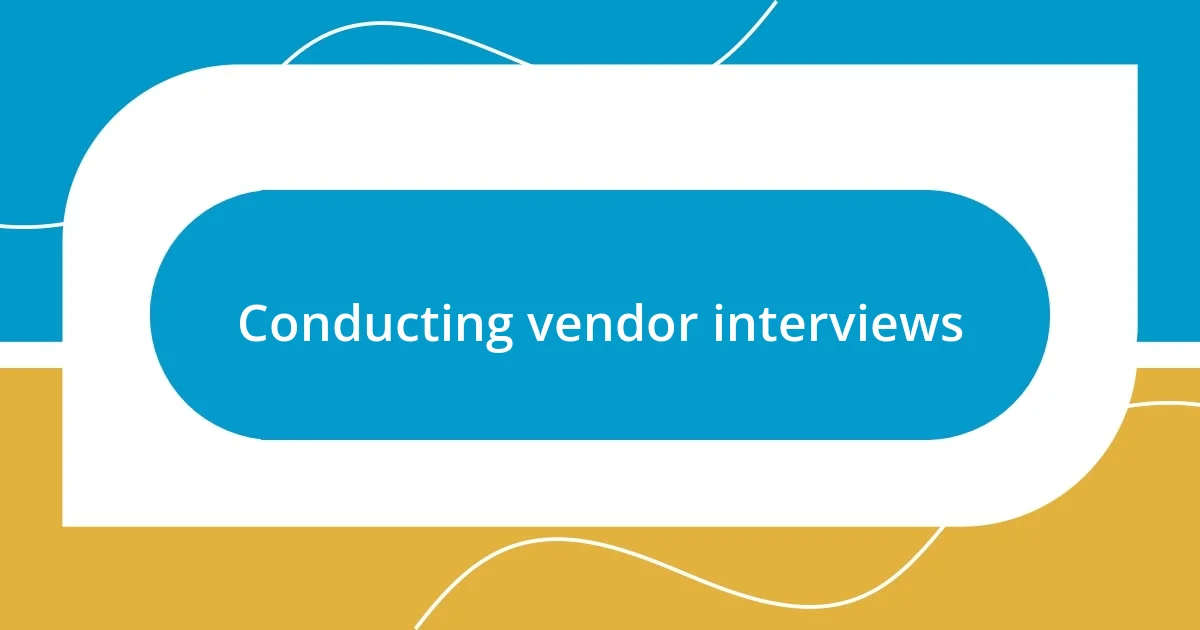
Conducting vendor interviews
When it comes to conducting vendor interviews, I approach it like a conversation rather than a formal Q&A. Initially, I like to establish a rapport; it’s during those casual exchanges that I find out who truly understands their craft. I remember one interview with a vendor who was so passionate about oysters that I could hear the excitement in their voice as they described their sourcing process. Their genuine enthusiasm not only captivated me but also reassured me that they would bring that same energy to the event.
As the interview progresses, I make it a point to ask open-ended questions that allow vendors to share their stories. For instance, I once asked a vendor about their favorite oyster dish, and they launched into a heartfelt tale about how it was inspired by their grandmother’s coastal kitchen. That personal touch gave me a glimpse of their dedication and vision—qualities that can set a vendor apart in a crowded marketplace. It’s intriguing to think about how those narratives can resonate with festival-goers, creating memorable experiences that go beyond just food.
I also pay close attention to vendors’ responses to potential challenges—how do they handle supply issues or last-minute changes? Their answers reveal their problem-solving abilities and commitment to quality. I had one vendor who candidly confessed to a hiccup during a previous event but shared how they turned it around by improvising—a true testament to resilience. After all, it’s not just about the oysters; it’s about their ability to adapt and deliver an exceptional experience under pressure. What do you think is more important: creativity in their offerings or problem-solving in their approach? Personally, I find that a balance of both can really elevate the festival experience.
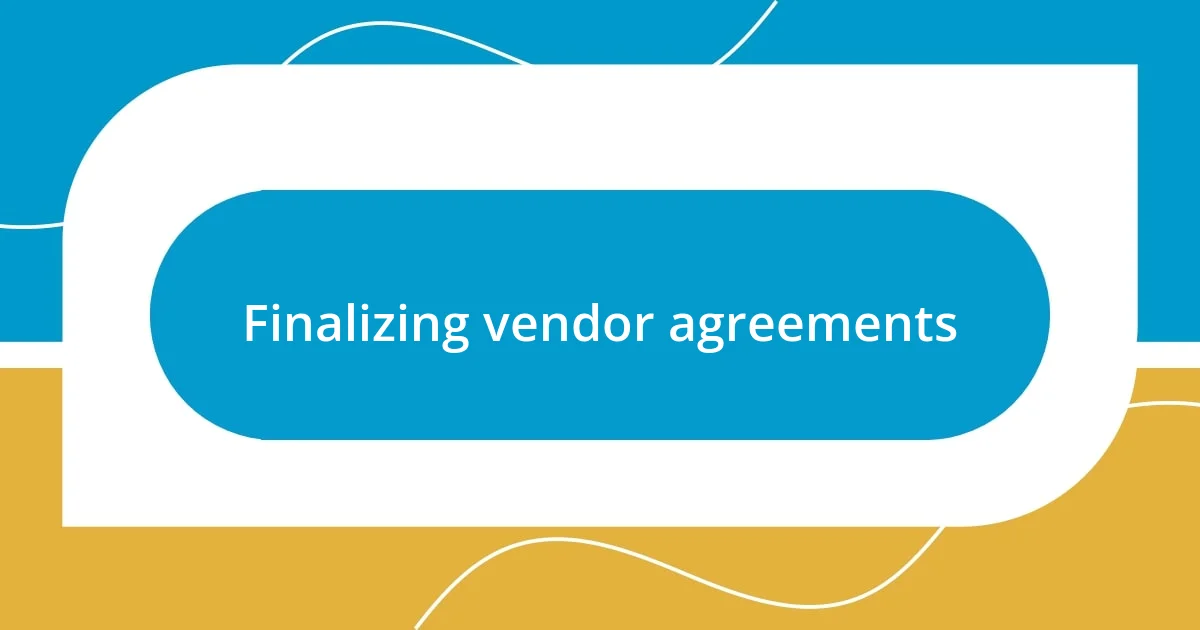
Finalizing vendor agreements
Once I’ve settled on my preferred vendors, finalizing the agreements is where the rubber meets the road. I remember the first time I drafted a contract; it felt a bit overwhelming. I had a vendor who provided a fantastic proposal but was unclear on some terms. I realized the importance of clarity—laying everything out step-by-step helps prevent confusion down the line. I always ask myself: “What are the key elements that must be included?” Ensuring both parties agree on logistics, payment terms, and expectations makes a world of difference.
I also pay close attention to the vibe during final discussions. I once had a vendor who seemed less enthusiastic about signing that dotted line. Their hesitance raised a red flag for me. It’s essential that both sides are excited about the collaboration; after all, we’re working together to create something special. I usually attempt to address any worries directly; open communication fosters trust and builds a solid foundation for our partnership.
Beyond just the fine print, I look for opportunities to add personal touches to the agreements. I once suggested collaborative branding on social media with a vendor I really clicked with. That extra step turned our partnership into a shared journey rather than just a business transaction. It’s those moments of creativity and connection that make the finalizing process feel rewarding. How do you feel about formal agreements in the festival space? I’ve come to see them as more than contracts; they’re commitments to a shared experience.
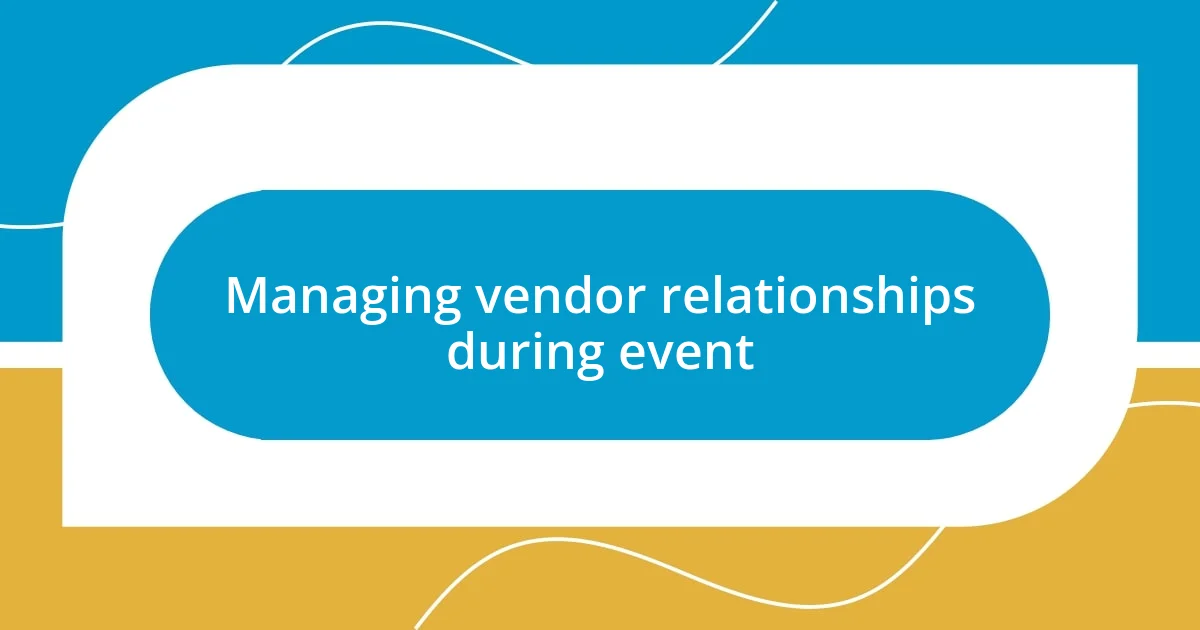
Managing vendor relationships during event
Managing vendor relationships during the event is crucial for ensuring everything runs smoothly. I remember a festival where, on the day of the event, one vendor misplaced their equipment. I quickly stepped in to help them locate it, turning a potential crisis into a collaborative moment. This type of support not only strengthens the relationship but also fosters a team atmosphere among vendors.
Communication throughout the event is essential. I set up regular check-ins, even if it’s just a quick text, to gauge how everyone is feeling. I once initiated a brief morning meeting to discuss expectations and share a cup of coffee with the vendors. The camaraderie we built that day made a noticeable difference in their attitudes, and it also helped address any issues before they escalated. Have you ever tried creating a sense of community among vendors? In my experience, it truly enhances their overall performance.
Additionally, I find that recognizing hard work goes a long way. After the event, I always take the time to thank each vendor personally. One year, I even surprised a group by bringing them a celebratory cake to acknowledge their efforts. That gesture not only reinforced our relationship but also made them feel valued, encouraging them to return for future events. How important do you think appreciation is in vendor relationships? In my view, it’s key to building loyalty and enthusiasm for the next Oyster Fest.
